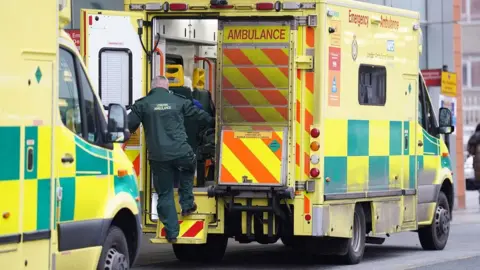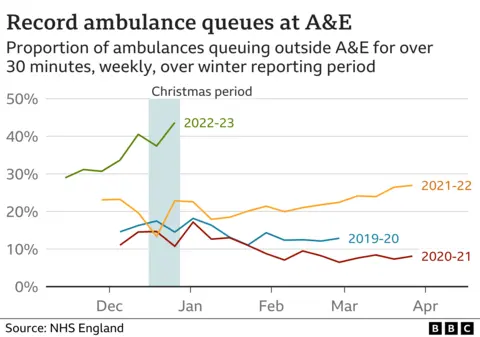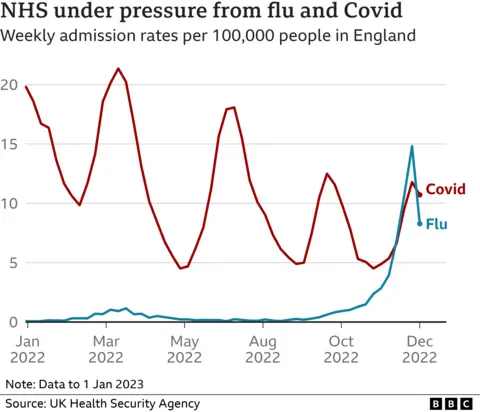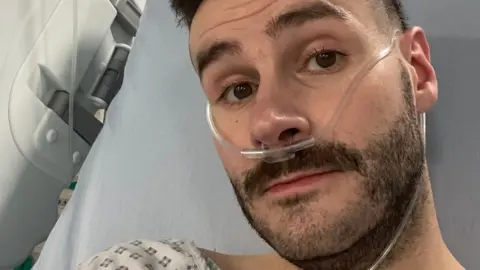Gridlock as record number of ambulances queue at A&E in England
 PA Media
PA MediaThe extent of the gridlock in hospitals over Christmas has been revealed, with data in England showing record numbers of ambulances delayed dropping off patients at A&E.
More than 40% of crews were forced to wait at least half an hour to hand over patients in the week up to 1 January.
That is the highest level since records began a decade ago.
But there is hope pressures could soon start easing, with flu and Covid admissions dropping last week.

Both had risen sharply recently. One in seven beds was occupied by patients with these infections by the start of the year.
The rate of flu admissions fell the most, dropping by more than 40%.
But the UK Health Security Agency is warning it is too early to say whether the flu season - the worst in a decade - has peaked, because reporting lags over the festive period may have affected the data.
And Matthew Taylor, of the NHS Confederation, which represents hospitals, said wards were still incredibly full, which was creating delays in A&E and for ambulances.
He said hospitals were facing "crisis conditions" that were presenting a risk to patients.

The high levels of flu and Covid coupled with the pressures on the NHS are thought to be key factors in the high number of deaths being reported.
In the lead-up to Christmas, deaths were a quarter higher than normal, data from the Office for National Statistics shows.

'I'm 26 and ended up in hospital with flu'

By Christmas Day, Olly Browning was exhausted, sweaty and breathless. Aged 26, he thought he would soon start recovering.
But the following day he was admitted to hospital and sent to intensive care where he spent three days getting round-the-clock care.
"It turns out I'd caught flu B - a rarer type of influenza. I knew I'd been unwell long before going to hospital.
"Maybe naively, I thought I could handle it as a healthy 26-year-old - I figured I just needed to wait it out another week or so. But I got worse before I got better."
He was eventually discharged on 2 January and is now recovering at home.
"I can't lie, it has been a terrifying experience. I cried a lot, about everything."

The past week has seen a number of hospitals declare critical incidents and start to cancel routine operations.
Reports have emerged of patients spending days on trolleys because of severe shortages of beds in some hospitals.

Have you been affected by the issues in this story? Share your experiences by emailing [email protected].
NHS national medical director Prof Sir Stephen Powis said: "We knew this winter would be one of the most difficult in the history of the NHS and I want to thank staff for all their hard work in caring for and treating so many patients while dealing with record demand on services, including the enormous pressure from flu and Covid."
Health Secretary Steve Barclay acknowledged there were "significant pressures".
He said the government was investing extra money, which was being used to open extra hospital beds, avoid people being admitted and help to ensure those who were ready to be discharged but require support in the community can get that more quickly.
But he added: "Now more than ever it is vital that all those who are eligible come forward for their flu and Covid jabs to reduce pressure on the NHS and help ensure emergency services can be there for those who need them."
Data journalism by Libby Rogers and Rob England
